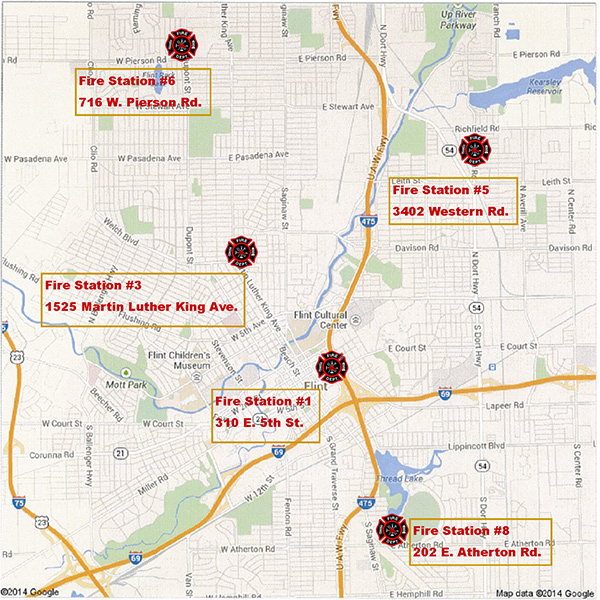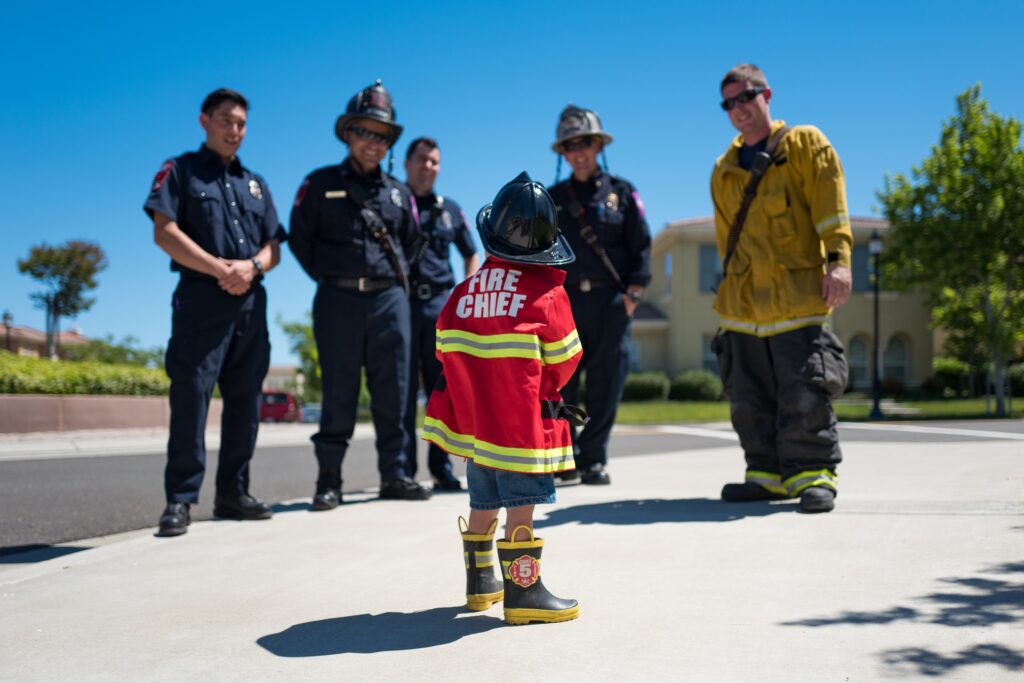Fire Department

Mission Statement
The Flint Fire Department’s mission is to serve and protect the people from loss of life and property from fire and other natural and man-made disasters, to provide emergency medical services that are responsive to the needs of our community, and to provide fire prevention and education activities to the citizens of the City of Flint.

Fire Safety begins at home.
Every family should know the basics of how to prevent fires at home and what to do in case there is a fire. So, invest a few minutes and learn how to BE SAFE!
Straight Talk – an injury prevention and community outreach program, created to affect the attitudes, knowledge and behavior of families in our community and to reduce the incidence of preventable injuries. For more details contact – (810) 762-7336
There are many things that people can do to improve their safety at home, school, or work from a FIRE! Below you will find a list of information that will help you to become more fire safe wherever you are. Also a list of information of things to do if you do have a fire, to get out alive.
Flint Fire Prevention Bureau
The Flint Fire Prevention Bureau (FPB) is a division within the Flint Fire Department whose function is to be proactive in fire suppression by working to prevent the occurrence of fires. Fire and life safety services are provided as well as educational presentations which serve to assist in raising awareness of potential hazards. The Bureau also is responsible for investigating suspicious fires when circumstances indicate that arson might be suspected.
Educating both city residents as well as visitors about fire safety is at the forefront of the FPB. This is accomplished through involvement in numerous safety and health fairs held throughout the community. The FPB teaches fire safety to children and parents alike during visits to schools and provides demonstrations with the department’s Fire Safety House. One-on-one guidance sessions are scheduled with juvenile fire setters and their parents with the goal of preventing this type of behavior and achieving a positive life-long impact.
The Fire Prevention Bureau consists of two fire code inspectors who conduct annual fire inspections at city businesses in an effort to ensure fire code compliance. The inspectors scrutinize facilities for hazardous materials with regards to the Firefighters Right to Know law, and operate the department’s “Project Get Alarmed” program, which provides residents with free smoke detectors.
Fire Prevention Tips:
Fire Safety
- Planned Escape From Fire
- Smoke Detectors
- If You Have a Fire
- Practice fire drills regularly using your escape plan.
- Keep matches and lighters out of the reach of children.
- Have a working fire extinguisher.
- Smokers always use a proper ash tray.
- Never leave cooking unattended.
- Wear clothes with short, roll-up, or tight-fitting sleeves.
- For each pot or pan you use, have its lid out to cover it.
- Keep the cooking areas clear of combustibles.
- Turn pot and pan handles inward on the stove so they can’t be bumped.
- Keep small children away from the cooking area while in use.
- Keep portable heaters and space heaters at least three feet away from anything that can burn.
Use electricity safely and remember:
- Avoid using extension cords where possible.
- Never run extension cords under rugs or carpet.
- Replace any frayed or cracked extension cords.
- Don’t tamper with your fuse box or use improper-size fuses.
- If any electrical appliance smokes or has an unusual smell, unplug it immediately, and don’t use it until checked or repaired.
- Have your chimney cleaned regularly to prevent chimney fires.
- If you have a fire in your fireplace, always close the screen or doors.
- Always empty your fireplace ashes in a metal container, and set them away from the house or anything that will burn
Have an Escape Plan that includes:
- Two different ways out.
- Someone assigned to help those that need help getting out.
- Someone assigned to call 911.
- A meeting place for everyone once they get out.
Things to Remember If You Have a Fire:
- GET OUT of the House or building and STAY OUT!
- Crawl low under the smoke.
- Feel doors with the back of your hand for heat, before opening.
- Open doors slowly and be ready to close them if heat or fire is outside them.
- Once out of the house or building, DON’T GO BACK IN FOR ANY REASON!
- Once outside go to a phone and call 911 to report the fire.
- If your clothes catch on fire: STOP, DROP, and ROLL until the fire goes out and cover your face with your hands.
- Close any doors you safely can as you are leaving the house or building.
Provide any helpful information to the Fire Department you can:
- Where the fire is located in the house or building.
- If anyone is still in the house or building and where they might be located.
- Any hazards that might be in the house or building.
911 Information
Make your 911 call count. Below is everything you should know when calling 911. An informed caller is the best caller. It’s extremely important to know how to help 9-1-1 help you. In an emergency, seconds matter, so being knowledgeable and prepared can make all the difference. Here are a few things you can do to make that happen:
Know WHEN to call 9-1-1. 9-1-1 is for emergencies only. An “emergency” is a potential threat to life or property, which requires immediate response from law enforcement, a fire department, and/or emergency medical services. If you aren’t sure if your situation is an emergency, always err on the side of safety and call 9-1-1. We are the experts who can make the determination.
Know WHEN NOT to call 9-1-1. Being late for a meeting and unsure of directions on how to get there is more than likely an emergency to the individual, but it is not for public safety. Inappropriate use of a 9-1-1 system wastes resources and ties up emergency lines. No one wants to be on hold when they are in the middle of a true crisis.
Know WHERE you are. This is probably the most important information you can provide as a 9-1-1 caller. If you are inside a structure with an address, give it to the operator. If there are multiple levels to the structure, let 9-1-1 know which floor you are on. If you are not inside a structure, find landmarks, cross streets or any other identifying marker to assist emergency responders in locating you or the emergency.
Stay Calm. When you are on the phone with 9-1-1, we need you as our eyes and ears. While the situation may call for panicking, please try to remain as calm as possible. When a caller becomes hysterical, which can happen, it is difficult for the 9-1-1 operator to understand you. This often adds a delay in getting responders to you. If possible, remain calm and strong, and answer all questions to the best of your ability. Remember, help us to help those in need.
NEVER Hang Up. Even if you dial 9-1-1 by accident, or the situation has resolved itself, it is important to let the 9-1-1 operator know this. If the call is ended abruptly, 9-1-1 will assume something has gone very wrong and will spend time calling back or sending help when it is not needed. This greatly impedes the 9-1-1 center’s ability to take and dispatch services to on-going emergencies.